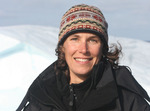Approaching Ice
Elizabeth Bradfield
Friday, 29 Mar 2013 at 11:00 am – Pioneer Room, Memorial Union
Elizabeth Bradfield's poetry collection Approaching Ice portrays the history of polar exploration. A finalist for the James Laughlin Award from the Academy of American Poets, the book conveys the wonders and dangers, physical and mental, encountered while endeavoring to reach this inhospitable region. Bradfield is also the author of Interpretive Work, which won the Audre Lorde Award. She has been awarded fellowships and scholarships from Stanford University's Wallace Stegner Program, the Bread Loaf Writer's Conference, the Vermont Studio Center, and elsewhere. In 2005 Bradfield founded Broadsided Press. The 9th Annual Symposium on Wildness, Wilderness & the Environmental Imagination: The Future of WaterThe Future of Water is a series of invited lectures, creative readings, interdisciplinary panel discussions and a documentary film about the secret life and turbulent future of the world's fresh and salt water supplies.
Cosponsored By:
- Bioethics Program
- College of Design
- College of Liberal Arts and Sciences
- Ecology, Evolution & Organismal Biology
- Geological & Atmospheric Sciences
- Graduate Program in Sustainable Agriculture
- History
- Landscape Architecture
- MFA Program in Creative Writing & Environment
- Wallace Chair for Sustainable Agriculture
- Committee on Lectures (funded by Student Government)
Stay for the entire event, including the brief question-and-answer session that follows the formal presentation. Most events run 75 minutes.
Sign-ins are after the event concludes. For lectures in the Memorial Union, go to the information desk in the Main Lounge. In other academic buildings, look for signage outside the auditorium.
Lecture Etiquette
- Stay for the entire lecture and the brief audience Q&A. If a student needs to leave early, he or she should sit near the back and exit discreetly.
- Do not bring food or uncovered drinks into the lecture.
- Check with Lectures staff before taking photographs or recording any portion of the event. There are often restrictions. Cell phones, tablets and laptops may be used to take notes or for class assignments.
- Keep questions or comments brief and concise to allow as many as possible.




